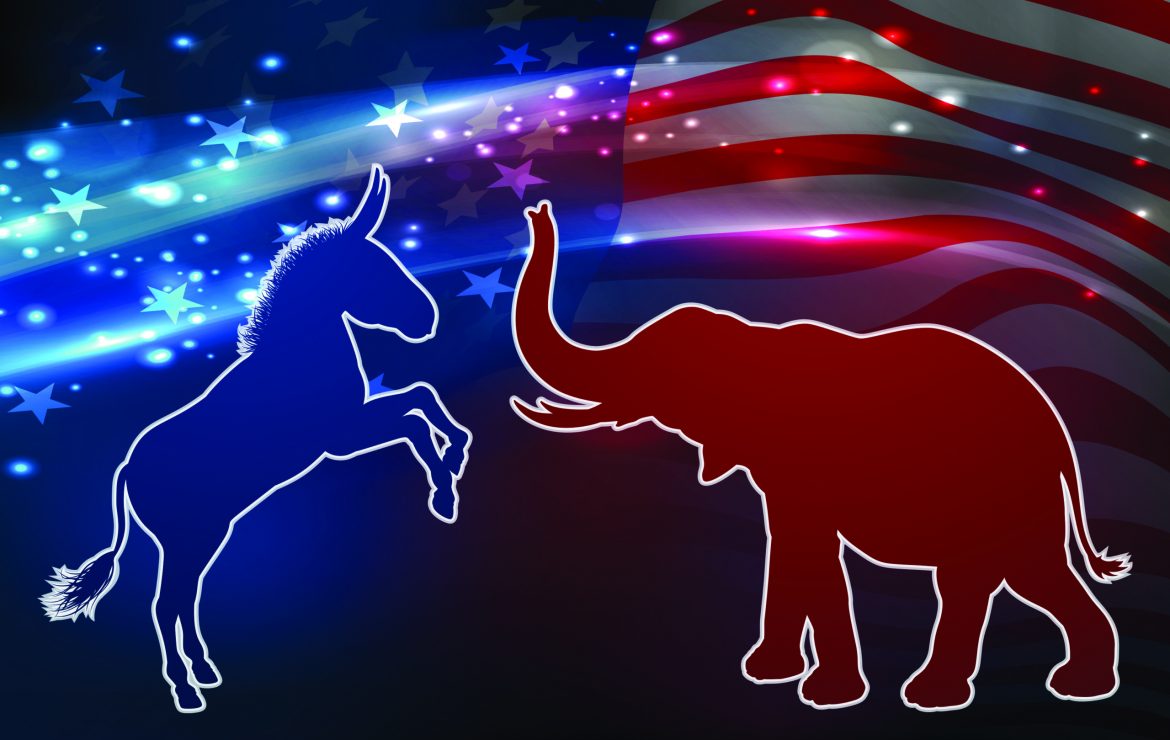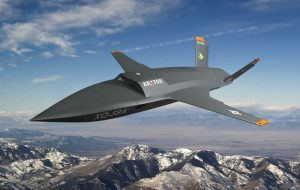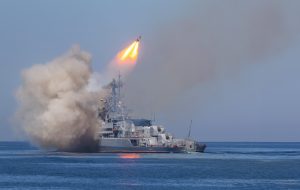US presidential elections stand as a key event that has been attracting the attention of the whole world for decades, reflecting the huge influence of the country on almost all global political and economic issues. But, this year, US elections drew more interest than ever in light of multiple factors, including the personality of the current President Donald Trump, his policy over the last four years, the intensity of the political polarisation and the significant impact of the elections on international developments.
The Middle East, of course, is following more closely the US presidential race amid a surge in protracted issues such as the Iranian nuclear programme, political and military conflicts in Iraq, Libya, Yemen and Lebanon and the latest developments on the Middle East peace process in addition to other regional disputes. In this respect, the present issue sheds light on the characteristics of the US presidential elections, the chances to win for each candidate and their stands towards the region’s main issues.
US voters do not cast ballot directly for their president as is the case in most republics. The chief executive is rather elected indirectly through the Electoral College. In the 1787 Constitutional Convention, the US founding fathers debated for months the thorny question of how to elect the president with some arguing that Congress should pick him and others insistent on a democratic popular vote. Both proposals were discarded on grounds that allowing the Congress to choose the president would result in a too much opportunity for corruption between the executive and legislative branches. At that time no other country in the world elected directly its president leaving the US delegates in uncharted territory. At the end, a compromise was reached according to which the president shall be picked by the Electoral College.
On the Election Day, registered American voters cast their ballots for the 538 members of the Electoral College, the same number of members as in the Congress.
The members of the Electoral College represent all US states based on their population with California having 55 electors, the highest number compared to 27 for Florida. Least populous states, such as Alaska, North Dakota and North Carolina in addition to Washington DC have three electors each. Each delegation member has a single vote. The presidential candidates need to an absolute majority of 270 + 1 vote to win the elections.
Each state counts its popular votes according to its own laws governing the designation of its Electoral College members. All states use the winner-take-all system for candidates with 50% of the votes, except Maine and Nebraska where the district system is used.
One of the disadvantages of the US presidential elections system is that it produced an Electoral College winner who did not receive at least a plurality of the nationwide popular vote. This has happened in 2016 when Donald Trump won majority Electoral College although he had 3 million less votes than Hillary Clinton. In 2000, George W Bush won 271 electoral votes, despite Democratic nominee Gore leading by over half a million more popular votes.
From another perspective, one of the main advantages of the Electoral College include the possibility of winning elections in the first round, in addition to averting any challenge to election results. John F. Kennedy defeated Richard Nixon by 118,000 more votes only. Moreover, direct ballot risks offering incentives to questioning election results and demanding a recount of votes which may trigger instability.
Trump and Biden
The political party system in the US, like many other democratic countries, is dominated by two main parties: The Democrats and the Republicans. The first are more into modern liberalism, while advocating state intervention, health care for all, affordable education, social programmes, environmental protection and labour unions.
The Republicans represent American conservatism. They believe in the need for curbing state intervention and support lower taxes, free capital market, gun rights, the dissolution of labour unions and restrictions on migration and abortion. Minor parties, including the Libertarian, Green and Independent parties are usually not represented in the Electoral College because they are overshadowed in the political scene by the two dominant parties.
President Donald Trump, the Republican nominee for the next presidential race, is the 45th president of the United States. He was a businessman and a celebrity prior to taking office. In the early 21st century, he run a foundation owning 500 companies operating in hotels, resorts, real-estate, consumer goods, entertainment and television.
In 2019, Trump became the third president in the US history to be impeached after Andrew Johnson in 1868 and Bill Clinton in 1998. Trump is also the first in US history who risked being removed from office by the Congress in his first term.
Trump claims that he came from outside the political class and that he aims to fight corruption in Washington. “America First” has been his electoral campaign motto. His foreign policy was marked by putting pressure on his NATO allies to increase funding for their collective defence. He also pressed South Korea to pay for the costs of the US forces stationed in its territory to provide protection against North Korean threats.
Joe Biden the Democrats nominee, started his Washington career with the US Senate in 1973. He led his first presidential electoral campaign in 1987. Despite being an experienced politicians and a contemporary of eight presidents, the press has castigated him for his multiple blunders including when he fabricated a story saying “my ancestors, who worked in the coal mines of Northeast Pennsylvania ,” and that he was upset because they did not receive the chance they deserve in life. This was a false statement plagiarized from a speech of British Labour politician Neil Kinnock whose relatives actually worked in coal mines.
Biden had numerous gaffes. He was picked as the first Vice President of a Black head of the executive, Barack Obama, whom Biden once described as an “African-American who is articulate and bright and clean and a nice-looking guy.”
During his current electoral campaign, he told a black host on a famous TV show: “if you have a problem figuring out whether you’re for me or Trump, then you ain’t black,” a comment that irked black American voters.
In addition to his blunders, Biden faces accusations of sexual harassment. Eight women accused him last year of inappropriately touching them and invading their personal space through unsolicited hugs and kisses. Tara Reade said he pushed her against the wall and sexually assaulted her when she was working in his office 30 years ago. TV channels broadcasted footage showing his invasive way of greeting women in public events which sometimes involves sniffing their hair.
Joe Biden chose Kamala Harris as Vice President in order to appeal for young black American voters. In case he won, Harris will be the first woman elected Vice President in the US history and the first black woman to have taken such a position. Now a running mate for Biden, Harris already looks forward to leading the party in the 2024 elections.
Harris had served as a District Attorney of San Fransisco from 2004 to 2011. She has been twice, in 2007 and 2011, Attorney General of California, becoming the first black American to take such a position in the US most populated state. In January 2017, she was sworn into the Senate in Washington as the first South Asian-American Senator and the second black American Senator.
The Significance of the upcoming elections
The centrality of the US presidential elections stems from Washington’s huge international influence and its global security role. Therefore, a change of the leader at the helm of the White House will reverberate globally with an impact on the US foreign policy. The 2020 presidential elections in particular are drawing attention from around the world for the following reasons:
1 -Foreign electoral intervention: Trump is often described by many US citizens as a controversial President as he keeps fiercely attacking his rivals in response to their criticism leading to widening divides within the American society. This took place for example during the 2016 elections pitting Republican Trump against Democratic Hillary Clinton. These divisions were worsened by accusations of foreign intervention in US presidential elections, claims that are expected to continue in the upcoming 2020 elections.
John Ratcliffe, national intelligence director, said in August 2020 that Russia, China and Iran are all trying to influence the outcome of November vote.
Director of the International Counter-Intelligence and Security Center, William Evanina said China prefers that Trump does not win a second term and that it “has been expanding its influence efforts ahead of November 2020 to shape the policy environment in the United States, pressure political figures it views as opposed to China’s interests.”
Similarly, Iran is seeking to undermine Trump’s chances to win elections, added Evanina, noting that Russia, to the contrary, is trying to denigrate Trump’s Democratic rival Biden in the next elections.
2- Coronavirus impact: November presidential elections will take place at a particular context marked by the global coronavirus outbreak as the measures to contain have turned into a heated electoral debate between presidential contenders: Republican Donald Trump and Democratic Joe Biden.
Kamala Harris, Biden’s Vice President nominee, said she would not trust Trump’s words on the safety of any coronavirus vaccine. Joe Biden, for his part, said Trump’s response to the virus put American lives at risk. Trump lashed out by calling Biden “a stupid person” who wants the US to be submerged by the virus and to put families under the yoke of the leftists and lose US jobs to the Chinese. This trading of accusations shows that the response to the pandemic will be a decisive issue during the next electoral campaign and may play a central role in favour or against one of the two presidential nominees.
3- The international and regional fallout: The US presidential elections will be held at a context marked by a surge in tensions between Washington and a number of global actors, notably China. Tension has also flared with Iran at a time both Beijing and Tehran hope the Democratic candidate Biden wins the presidency, despite the fact that the Congress has a pivotal role in shaping US foreign policy putting limits to the changes the President can bring to Washington’s relations with the rest of the World.
During Trump’s presidency, American-Chinese ties have deteriorated considerably on the back of Trump’s insistence to end trade preferences with China, a move often described as unfair by Trump’s opponents. The president also offered incentives to encourage US firms to relocate from China to the US, including tax breaks. He also threatened to withdraw government contracts from companies that continue to outsource work to China. The two countries have waged a trade war increasing duties on each other’s exports. The intensity of this standoff abated recently although the two countries haven’t settled their divergences yet.
Disagreements between the US and China spilled over from the economic to the geostrategic level with rising tensions in the South China Sea. Hence, China hopes that Trump will not be re-elected and that Biden wins the presidential vote which could pave the way for a settlement of thorny issues between the two countries.
In the Middle East, Donald Trump withdrew from the Iranian nuclear deal and tightened sanctions on Tehran, in a bid to make it review the nuclear agreement which has pitfalls that could enable Iran to possess a nuclear programme that can be employed for military purposes. The deal has also turned a blind eye to Iran ballistic missiles programme and its interferences to the detriment of regional stability.
John Kerry, one of the democratic leaders who have criticized Trump’s foreign policy, actually told Iranian officials not to negotiate with Trump and wait for the election of a Democratic president. The Iranians seem to have taken his advice seriously as they pin hopes on the election of Joe Biden next November
so that he can lift sanctions imposed by Trump and help save the pandemic-hit Iranian economy from an impending collapse.
4 -The standoff with US institutions: The US President kept withdrawing from conflicts in the Middle East which he considers as losing battles. He said the US should leave Afghanistan and reduce forces in Syria and Iraq, in a move to use these withdrawals as one of the key achievements of his administration.
These decisions have been met with opposition from the US military. Speaking to the media, Trump deplored that his opponents in the Pentagon want to fight wars to make arms manufacturers happy. This has triggered an indirect response from the US Army Chief of Staff James McConville who said “Senior leaders would only recommend sending troops to combat when it’s required as a national security, or as a last resort.” This standoff could be renewed in case Trump won the elections.
Positions on the Middle East
President Donald Trump and Democratic candidate Joe Biden adopt different stands concerning most Middle Eastern Issues although they tend to agree on some key questions.
These positions should be taken lightly, notably those of the Democratic candidate who seems to express stands in order to win most American votes often resorting to exaggeration and promises that may not be fulfilled.
The circles where the US foreign policy is made, namely the State Department, the Pentagon and the Congress play a preeminent role in defining US Middle East policy. They may set limits to some of the choices of the new President or intervene to amend them. In light of the above, the salient Middle Eastern issues raised by the two contenders are:
1 -Military involvement in the region’s conflicts: US President Donald Trump tends to withdraw from protracted conflicts, including those in Afghanistan, Iraq and Syria, despite opposition from the Pentagon and the State Department. Trump insists on recalling troops from these countries as was the case with Syria in 2018. In the same vein, US officials unveiled Trump administration’s plan to reduce US forces in Iraq from 5000 to 3500 soldiers. The US administration has also adopted a plan last June providing for a reduction of its troops in Afghanistan from 8600 to 4500 soldiers. This should take place in November before the presidential elections although peace talks between Taliban and the Afghan government only started in early September amid huge challenges.
Meanwhile. Democratic candidate Joe Biden was in line with Trump promising a down-scaling of US military presence in the Middle East if he was elected president. He said forces abroad will be asked to direct military effort in cooperation with allies in order to put an end to military organisations such as ISIS. He expressed his belief that US forces in conflict-stricken areas should be maintained at 1500 to 2000 soldiers only. Therefore, Biden seems to agree with Trump to continue withdrawing troops from conflict areas.
2- Iranian nuclear programme crisis: Trump has adopted a policy leading to re-imposing sanctions on Iran as part of what he called “maximum pressure” in order to push Iran to review the nuclear deal, stop its regional interferences and abandon its hegemonic plots in Arab countries. US sanctions gradually tightened from undermining Iran’s oil export capacities to subjecting bodies within Iran to sanctions such as the central bank because of its financing of terrorist groups such as the Houthis in Yemen, Hezbollah in Lebanon in addition to listing the Revolutionary Guard as a terrorist organisation.
For his part, Joe Biden’s position on Iran is not clear yet. He did not explain whether he will restore the nuclear deal with Iran – as his supporters and Democratic party members wish- or if he will continue Trump’s policy urging Iran to make real concessions for sanctions to be lifted.
Biden had asked for suspending US sanctions on Iran citing the heavy repercussions of the coronavirus on the Iranian economy. Likewise, an analysis of the preferences of the team of the Democratic candidate Joe Biden show that they advocate easing sanctions on Iran in order to entice it to return to the negotiation table and revive the nuclear deal.
3 -Turkey’s hostile interferences: Since the beginning of 2020, Turkey has openly militarised its foreign policy using terrorist groups in Iraq and Syria as interference instruments. It has relocated some of these groups into Libya to support the government of national accord against the Libyan national army which has the support of the elected parliament. These actions have been a source of concern for neighbouring Arab states as well as for France. Such groups could easily proliferate in the Sahel posing a new risk to French interests as it continues its war on terrorist groups in the region.
Turkey has also intensified its gas explorations in Greek territorial waters, triggering a condemnation by global actors, including the US and the EU. This has led the US to look with a suspicious eyes to Turkish actions while trying to contain them. In this respect, US Secretary of State Mike Pompeo visited Nicosia, Cyprus capital, on September 13 and called on Turkey to withdraw troops from the Mediterranean to diffuse tension with Cyprus and Greece. Washington also signed a Memorandum of Understanding with Nicosia to create a training centre which entails US military support in the face of Turkish expansionism.
Joe Biden is more outspoken in his criticism towards Turkey. He slammed Erdogan in an interview with the Weekly show on FX saying he was “very concerned” about developments in Turkey, adding that he will adopt a different approach towards Erdogan if he wins the presidency of the United States by supporting Turkish opposition as he used to do when he was Obama’s Vice President.
Biden avowed he has spent more time with Erdogan than any other member of the US administration. He said the Turkish president spoke to him because he thought that he was not an enemy of Islam. He described Erdogan as an “autocrat…who has to pay the price for his deeds,” sending a signal that Turkish-US relations brace for tumultuous waters if he becomes president especially if Washington moves to curb Turkish interferences in regional crises.
4- Political Islam: Donald Trump is an opponent of political Islam movements, on top of which the Muslim Brotherhood, which he described as no less dangerous than extremist and terrorist groups. The brotherhood has in fact forged ties and tacit agreements with extremists in several Middle Eastern states. Moreover, the main tenets of the Muslim Brotherhood offered the breeding ground for extremist and terrorist ideologies instigating hatred and violence. Therefore, Trump has identified fighting such groups as a primary goal of American foreign policy. He announced in April 30 that he will list the Muslim Brotherhood as a foreign terrorist organisation.
Biden, on the other hand, shares the views of former President Barack Obama on political Islam which considers the group as a facet of moderate Islam. That is why the Obama administration was not worried by the Muslim Brotherhood taking power in many Arab countries after the chaos that plagued the region in 2011. This also explains why several organisations linked to the Muslim Brotherhood support Joe Biden in the presidential race, as they see in him a chance to resurrect the political Islam project in the region.
5 -Peace with Israel: The US helped the UAE and Israel seal a peace deal and freeze Israeli plans to take Palestinian territories. The agreement was signed on September 15. Bahrain followed suit inking a similar deal with Israel. Trump is poised to build on these inroads in his electoral campaigns as landmark achievements of his administration.
Such peace initiatives with Israel are, however, expected to be supported by both candidates as Biden also lauded the deal as a “historic step” to ease tension in the region and commended the UAE for taking such a “welcome, brave, and badly-needed act of statesmanship.”
Yet, disagreements remain between Trump and Biden regarding Israel. While Trump supports Tel Aviv expansion to the detriment of Palestinian territories, Biden promised to put pressure on Israel to halt building settlements. He also supports the two state solution with the aim of creating a Palestinian state. Biden also expressed his rejection for Trump’s decision to move the US embassy to Jerusalem in 2018, although he hinted that he will not revert the decision if he becomes president.
Candidates popularity in popular polls
National polls show that Joe Biden leads the polls ahead of Trump. His popularity hovers around 50% in recent weeks and has sometimes widened the gap with Trumps by nearly 10 percentage points. However, the race is not over for Biden yet due to two main factors:
1 -Failure of 2016 polls: Hillary Clinton led the polls in 2016 presidential elections, but she lost the vote. It is not fair however to say the polls failed to predict the election outcome because Hillary won the popular vote and had 3 million more votes ahead of Trump, who received more electoral college votes and became president.
Polls also faced technical problems in 2016 and failed to well-represent voters lacking university degrees which in turn led to missing the advance of Trump in some swing states. It is expected that polling companies have fixed this for the upcoming elections.
2- Repercussions of unexpected events: Unexpected events can affect the popularity of candidates and influence the public opinion in a way that pushes them to switch their vote for the other candidate and backtrack on their former polled decision.
This applies to the case of Donald Trump who increased his chances to win the next elections on the back of the improvement of the American economy. But the coronavirus outbreak earlier this year and its fallout on the US with large swathes of the population throwing responsibility on Trump for his ill-management of the crisis is set to undermine the popularity of the current president and play into the advantage of Democratic Biden.
Trump is aware of this reality and has rushed to put pressure on the Food and Drugs Administration (FDA) to find a vaccine before November presidential elections. The FDA allowed the use of convalescent plasma for the treatment of Covid-19 patients before it assessed its results in random clinical trials. There are also fears that the Trump administration would approve a vaccine prior to November vote in order to boost Trump chances to win.
Even if the vaccine was approved, this may still affect Trump’s chances to be re-elected especially if side-effects appear or if it was proven to be unsafe like Oxford vaccine.
From another angle, Biden, 77, seemed in some of the public appearances of his electoral campaign unable to maintain his speaking pitch. His speeches were criticised, particularly when he raised “the battle for America’s soul.” He never explained what he meant by that. Some observers think that the more he speaks the less chances he has to win the vote. Any deterioration of Biden’s health would gear American votes towards Trump’s advantage as was the case with Hillary Clinton in 2016.
The Position of the United Arab Emirates
Minister of State for Foreign Affairs, Dr Anwar Gargash told a US media that the UAE does not favour a presidential candidate over another, adding that the choice of the president is a domestic American issue and that the UAE will deal with the chief executive that the American people chooses.
From another viewpoint, the policy options of each candidate regarding the Middle East do not pose a significant challenge to UAE interests, particularly after the Gulf country reinforced its own national security capabilities strengthening its position at more challenging contexts such as when Obama administration adopted disengaged regional policies by signing the nuclear deal with Iran in 2015 with all its pitfalls and the lifting of Washington’s sanctions on Tehran allowing it to mobilise frozen assets abroad to fund militias in Syria, Iraq, Lebanon and Yemen directly threatening Gulf countries’ security.
Abu Dhabi has also diversified its partnerships with global powers involved in the Middle East. It has fostered ties with China and stepped up cooperation with Russia on regional issues with a view to contributing to regional stability.
In light of the UAE’s regional stability role, it has been on advanced talks with the US to acquire F 35 fighter jets. Minister of State for Foreign Affairs, Dr Anwar Gargash said the UAE ordered the aircrafts and that the US was examining signing an agreement to that end.
The UAE has forged military partnerships with Russia and China, particularly after Washington imposed restrictions on the sharing of drone manufacturing technology. Abu Dhabi has also managed to develop its own domestic military industry to curb dependence on arms imports. Today, the UAE military industry stands as one of the most advanced in the Arab region as it continues to forge partnerships and acquire advanced technology which enabled it to have its own drones, ammunition and maintenance.
At the end, the re-election of Trump means a US foreign policy permeated by the “America first” doctrine which implies more American disengagement from conflicts, unilateral policies and stiff stands regarding China and Iran. The election of Joe Biden would lead to more multilateral alliances to tackle challenges to US foreign policy and its allies while diffusing tensions with China and Iran.













